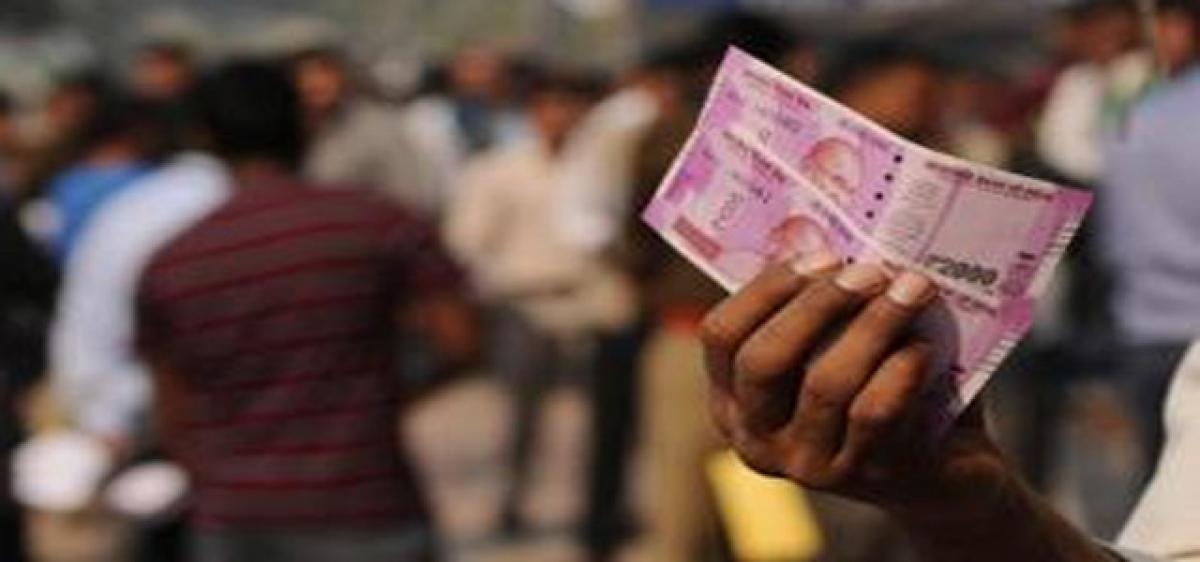Live
- Our govt will extented all help to young entrepreneurs: Ponnam
- IT Minister reassures govt support to start-ups
- Naidu, Pawan say it is Maha display of ‘people’s trust in PM’
- It’s only industrial corridor, not a Pharma City, CM clarifies
- Sathya Sai’s teachings of love worthy of emulation, says Guv
- Sowing the seeds of democracy
- Sudanese army recaptures capital of Sinnar State in central Sudan
- Kishkindha Kaandam Review: Some movies prove not to compromise in having a good cinematic experience and this is one of them
- Son-rise: Hemant Soren grows taller as tribal leader, makes father proud
- ISL 2024-25: 10-man NorthEast United FC hold on to take three points vs Punjab FC
Just In

Demonetisation continues to be the fulcrum of political discourse and street mobilisation. The dust and din generated on the political highway is vitiating the debate on cashless journey.
Demonetisation continues to be the fulcrum of political discourse and street mobilisation. The dust and din generated on the political highway is vitiating the debate on cashless journey. The average Indian is caught in the cross fire of polemics. Digital interfaces are fast replacing transactions in paper currency as government increasingly harps over the curse of cash.
Technology is completely transforming the nature and character of banking transactions in India. It's also equally true that technology enabled fiscal transactions have immensely benefit the banks and their customers alike, the latest innovations being mobile banking and mobile wallets. This trend is all set to further accentuate with the deeper penetration of smart phones and proliferation of bank accounts due to the push for financial inclusion. Mind boggling tech driven innovations in financial services are in the offing.
Technology can save human time and energy to a great extent which can be productively used elsewhere. For instance, estimates suggest that in May, 2016, cumulatively Indians made more than 730 million withdrawals from two lakh ATMs. Even if we assume five minutes for each ATM transaction, we waste more than 60 million man hours every month. India spends Rs 34.2 billion to print the currency notes for one year. Similarly, Indian banks spent Rs 158 billion in 2016 fiscal for installation and maintenance of ATMs.
This is precisely the attraction behind the digital economy. But, behind this fascinating win-win scenario for banks and customers presented by technological innovations, the imminent risks cannot be ignored due to our love and lust for cashless. In a country where there exists an eminent technological divide, such a rapid transition to cashless would leave out vast sections marginalised in the corridors of sophisticated technological advancement. This divide should first be addressed before treating the curse of cash.
Not just the marginalised people, even the cash driven sectors would also be hard hit. There are losers and gainers in every transition. The government should have natural ally in the losers. No one should be left on the loop line in the frantic attempt to take the nation on the global technological mainline.
This requires a paradigm shift. Not to object to the adoption of technology in the financial sector. But, the income divide, the technological divide, the literacy divide and many more such crippling divides should atleast be reasonably addressed before we attempt to do away with cash in a preference for cash less. Besides, a regulatory architecture to deal with the fraudulent practices, a responsive apparatus that could intimately attend to the grievances of customers, the transaction eco system that is cost effective are the need of the hour.
Hallucination cannot determine the economic policy premise. At the same time die hard beliefs cannot resist our marriage with modernity. Public policy cannot be held hostage to petty political squabbles. Wisdom cannot be judged in the shouting matches on small screen. People and the government should walk an extra mile to reach at a converging point on India's path to cashless. Political cacophony cannot be allowed to hold nation’s larger interests to ransom.

© 2024 Hyderabad Media House Limited/The Hans India. All rights reserved. Powered by hocalwire.com







